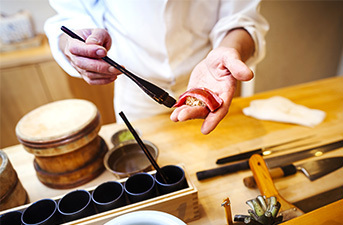Restaurants(9639)
Sushi Kakuno
Sushi powered by the spring water from the Sakurajima volcanic belt — in fashionable Roppongi, Chef Kakuno Masayuki gets the greatest satisfaction when his guests smile.
Ginza Wakuta
Fugu in winter, sakura shrimp in spring — located close to Ginza Station, Ginza Wakuta has earned its place among the district's premier kaiseki restaurants with its signature seasonal clay pot rice.
there is ramen
This Michelin Bib Gourmand ramen shop in Ogikubo prefers to let its food speak for itself, with simple menu offerings that belie the complex flavor of its soup.
Ramen Break Beats
Chef Takuro Yanase’s unorthodox spin on ramen has attracted a lot of attention, to the point where it’s earned him a Michelin Bib Gourmand 2024. Try seasonal menu offerings or stick to the tried-and-true classics of salt and soy sauce ramen.
Hoppers
Chef Kazuhiro Ito has done it again: his Michelin Bib Gourmand award for Spice Cafe has now been followed up with one more for Hoppers in 2024.
Charcut
This Michelin Bib Gourmand-awarded Toranomon charcuterie specialist doesn’t just wow with its huge variety of cold cuts, but also the 100-plus wines in its selection.

Katsuyoshi Nihonbashi Ningyocho
Set in the “Doll Town” of Tokyo’s Nihonbashi district, the chefs behind the dark wooden counter of Katsuyoshi fry up gorgeously fatty, thick cuts of pork and other luxurious ingredients.
Jeeten
The name of this restaurant comes from the Chinese pronunciation of owner-chef Katsuhiko Yoshida’s name — similar to how Japanese yakuzen cuisine and Chinese influence come together in its kitchen.
Trattoria Buca’Massimo
The highlight of this Michelin Bib Gourmand restaurant is the bistecca alla fiorentina, a traditional Tuscan steak weighing up to 800 grams, and measuring up to four centimeters thick.
Bistro Glouton
This Ikejiri-Ohashi restaurant run by a husband-wife duo offers the quintessential French bistro experience. Classic French fare like duck confit and ratatouille employs the best of Japan’s seasonal produce.
Lien
Offering courses of flavor and sentiment, the Michelin-recognized Lien offers an intimate, insightful French dining experience. All courses are made using fresh ingredients from the chef’s hometown in Aomori for a personal touch.

Soba Osame
Pairing rustic soba with regional small plates, Soba Osame mirrors the idyllic glades and Thoreauvian mountain towns of Japan through its menu.

Tonkatsu Narikura
The characteristic white color of the tonkatsu batter at this Minami-Asagaya restaurant comes from a low-temperature frying process that gives the pork maximum juiciness — and a Michelin Bib Gourmand award.
Tohakuan Karibe
The highlight of this Michelin Bib Gourmand soba restaurant is its extensive wine selection, which changes every week at the recommendation of a sommelier. Seasonal tempura offerings keep guests coming back for more.
Yakiniku Kokonomi
This Ebisu yakiniku restaurant’s name literally means “only here”, referring to its claim to serve the “original” wagyu beef — Takenotani-tsuru beef from Okayama — that can only be eaten there.
Hiroshima Yagumo
This Hiroshima hotpot restaurant was serving shabu-shabu before it was even called shabu-shabu. Tuck into the finest Japanese beef dipped in a homemade sauce, all while surrounded by traditional Japanese folk art.
Yagumo Nagarekawa
At the Nagarekawa branch of one of the first restaurants to serve shabu-shabu, guests can enjoy the finest kuroge wagyu black beef in a homemade sauce, all while surrounded by traditional Japanese folk art.
Wagyu Amiyaki Kaiseki Sizzler
For over 50 years, this Hiroshima yakiniku restaurant has offered 25 different cuts of beef from every possible part of the cow. Each one is kuroge wagyu black beef from the Hiroshima region for maximum freshness.
Teppanryori Mimitei
Discover Hiroshima’s best-kept secret at this teppanyaki restaurant: Hiroshima beef, which has a melting point so low it literally melts in the mouth.

Saito
Witness how minor alterations to ingredients alter the flavors significantly at this Roppongi sushiya.
Shu Xiang Xiang
Bow down to the Sichuan master — Shu Xiang Xiang, in Shinjuku, gives gourmets every reason to fall in love with the region’s tongue-numbing, zesty spices and flavors through its riff on Chinese cuisine.
Arakicho Tenpaku (Formerly Kondou)
As is apt for an establishment that takes its name from a Zen saying about purity and natural beauty, this tempura restaurant uses pure taihaku sesame oil to enhance the inherent flavor of its carefully-chosen produce.
Akasaka Momonoki
Cantonese cuisine excitingly expands on traditional recipes with the chef’s tasteful incorporations of Kyoto-grown ingredients.
Iseju
Once-in-a-lifetime indulgence of hand-cut A5 kuroge wagyu sukiyaki cooked on charcoal and drenched in warishita sauce, prepared with the uncompromising standards expected from Tokyo’s oldest sukiyaki restaurant in Nihonbashi.
Shunsai Hayato
Cuisine fit for a king. Near the Korakuen Gardens, this Okayama restaurant keeps the cuisine of the feudal lords of fine otonosama-ryori alive. Feast on fresh sashimi and Chiya beef, a wagyu cattle so rare it bears the title of “phantom wagyu”.
Hondori Sasa
This central Hiroshima restaurant prepares fresh Setouchi seafood and other local seasonal ingredients through a variety of ancient grilling methods that have been all but lost to time.
Sumiyaki Kaminari Main Store
This legendary Hiroshima yakitori restaurant uses a combination of “tohbi” distant-fire charcoal grilling to seal in the flavor, as well as a tashi-tsugi sauce that has been continuously added to for over 40 years of operation.
Sumiyaki Kaminari Shintenchi
This legendary Hiroshima yakitori restaurant uses a combination of “tohbi” distant-fire charcoal grilling to seal in the flavor, as well as a tashi-tsugi sauce that has been continuously added to for over 40 years of operation.
